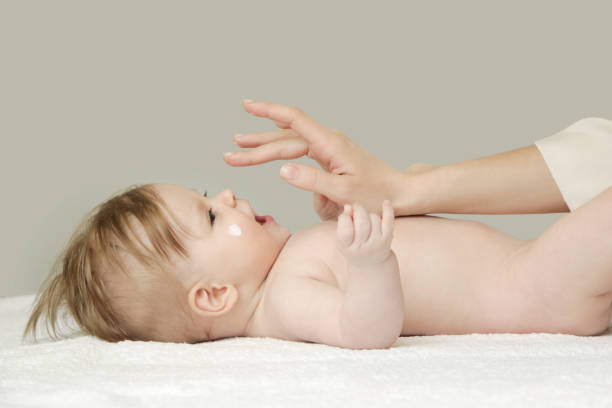The moment you hold your little bundle of joy, you make up your mind that you want nothing but the best in this world for your baby. We as a parent are extremely conscious when choosing the products for our baby. The market is flooded with products and at times it gets extremely tough to choose the best for the baby. Honestly, many so-called safe products in the market are loaded with hidden harmful chemicals which can create long term harm to the baby. Only during my recent research, I come to know about phenoxyethanol and I was shell shocked to know about the findings.
What is Phenoxyethanol?
Many baby brands are constantly researching and trying to find out new products which aren’t harmful to babies. We are well aware of the ill effects of paraben in baby products but many of us don’t know about phenoxyethanol. It is an alternative to paraben and it is also harmful to the skin and can be the reason for many skincare allergies and rashes. Phenoxyethanol is also created synthetically which can have an ill effect on the skin.
How Phenoxyethanol is synthetically manufactured?
Phenoxyethanol is created synthetically by treating phenol with ethylene oxide in an alkaline medium. It also contains glycol which is commonly found in paint, jet fuel, and lacquer and unfortunately, it is also found in so-called safe newborn baby products. Phenoxyethanol works as a preservative which increases the expiration period of the product. This is why phenoxyethanol is one of the primary ingredients to avoid in baby products.
Adverse Effect of Phenoxyethanol:
- Affects the central nervous system of babies.
- The other phenoxyethanol side effect is that it can damage the organs of babies if used in the long term.
- Leads to skin irritation and inflammation.
Why phenoxyethanol is a big NO for babies?
You will be shocked to know that as per recent research, phenoxyethanol is toxic for babies and also damages their central nervous system even in small concentrations. When phenoxyethanol enters the system it can affect immunity and lead to multiple skin irritations. The excessive use of phenoxyethanol can cause chromosomal changes, lead to genetic mutation and also can cause testicular atrophy which can affect the human reproductive system. Unfortunately, phenoxyethanol holds rank 10 among 3000 allergens which are highly harmful at lower concentrations. The phenoxyethanol side effects are huge.
Alternatives to Phenoxyethanol
When it comes to skincare products for babies, choosing safe and gentle alternatives to phenoxyethanol is crucial. Here are some options:
Organic acids
Natural organic acids like citric acid, lactic acid, and sorbic acid can act as preservatives in baby products. They are milder and less likely to cause irritation compared to synthetic preservatives like phenoxyethanol on skin.
Plant extracts
Certain plant extracts such as rosemary extract, grapefruit seed extract, and neem extract have antimicrobial properties and can be used as natural preservatives in baby skincare formulations.
Essential oils
Some essential oils like tea tree oil, lavender oil, and chamomile oil have natural antimicrobial properties and can be used in low concentrations as preservatives in baby products than phenoxyethanol safe for skin. However, it’s important to choose oils that are safe for babies and to use them sparingly to avoid skin irritation.
Vitamin E
Vitamin E, or tocopherol, is a natural antioxidant that can help extend the shelf life of skincare products by preventing oxidation. It can be used as a preservative in combination with other natural ingredients.
Leuconostoc/Radish Root Ferment Filtrate
This natural preservative is derived from fermenting radishes with a lactic acid bacteria called Leuconostoc kimchii. It has antimicrobial properties and is suitable for use in baby products.
Conclusion
Prevention is anyway better than cure and it is important for us parents to be well informed about the ingredients present in baby care products. As a parent, we should also double-check the labelling of products to keep a close tab on the ingredients present in them. Chicco is one such brand which has zero phenoxyethanol in its products and also offers the best chemical-free baby products that are safe and extremely gentle on the delicate baby’s skin.
FAQs on Phenoxyethanol in Baby Products
1. How can I avoid products containing Phenoxyethanol?
To avoid products containing phenoxyethanol, check the ingredient list on skincare labels. Look for products labelled “phenoxyethanol-free” or opt for natural and organic baby products, which are less likely to contain this preservative.
2. What are the safest preservatives for baby products?
The safest preservatives for baby products are those that are gentle, hypoallergenic, and effective at preventing microbial growth without causing harm to delicate skin. You can go for organic preservatives such as oils or can choose from the blog above.
3. Can Phenoxyethanol cause long-term harm to Babies?
There’s limited research on the long-term effects of phenoxyethanol for skin side effects specifically on babies. However, some studies suggest that high concentrations or prolonged exposure to phenoxyethanol may cause skin irritation or allergic reactions.
Read more blogs for pregnancy and child-care at Buding Star.
More Blogs To Read
7 Pregnancy Tips To Consider For An Expecting Mom
Tips To Make Your Pregnancy Easier And Even More Beautiful
5 most useful things to be done during pregnancy!!
Top 19 Symptoms of Baby Boy During Pregnancy
- 5 Easy to Prepare Drinks to Help Boost Breast Milk - September 22, 2024
- 50+ Heartfelt Holi Wishes For Your Loved Ones - March 19, 2024
- Holi Games for Kids: Exciting Outdoor and Indoor Activities for a Joyous Celebration - March 19, 2024
- 5 Delicious Best Holi Festival Recipes - March 19, 2024
- Keeping Your Pregnancy Positive - February 26, 2024
- Crafting A Medical School Path: Tips For Parents - January 24, 2024
- Guide To Managing Twin Babies With Ease - January 3, 2024
- 5 Tips To Be A Happy Special Needs Mommy - January 3, 2024
- DIY Ideas To Decorate Kids’ Room - January 3, 2024
- Tips To Use Mindful Parenting In Today’s Time - January 3, 2024













